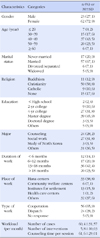Abstract
Purpose
This study was done to identify the causes of burnout among South Korean counselors for North Korean refugees.
Methods
Data were collected using open-ended questions in a survey from 85 South Korean counselors for North Korean refugees, and a content analysis of the textual data from the questions was conducted.
Results
A total of 192 statements were selected from the data and those were categorized into 3 domains, 8 categories, and 24 sub-categories. Institutional, client, and social recognition domains emerged. Findings indicate that the causes of burnout were derived from the following categories: 1) the categories for the Institutional domain were physical environment, work conflict, and work overload, 2) for the client domain, lack of cooperation, selfish attitude, and limits to interventions, and 3) for the social recognition domain, lack of rewards and identity confusion.
Conclusion
The results indicate that community mental health professionals need to understand these causes of burnout among the counselors working with North Korean refugees. It is also necessary to do further research to develop strategies to prevent burnout and potential mental health problems for these counselors.
Figures and Tables
References
1. Berg BL. Qualitative research methods for the social sciences. 2004. 5th ed. Boston: Allyn and Bacon.
2. Cho SY. A job stress and self-efficacy of child care teachers. Korean J Child Stud. 2005. 26(4):55–70.
3. Cho YA. North Korean defectors' counseling needs and the predicting factors for their professional help seeking behaviors. Korean J Couns Psychother. 2009. 27:285–310.
4. Jeon JH, Park YS. The effects of individual characteristics and health beliefs on North Korean refugees' health behavior. J Korean Acad Community Health Nurs. 2012. 23:82–90.
5. Jeon WT, Yoon DY, Eom JS. Survey results of adaptation and life of North Korean defectors in South Korea, 2001. Korean Unification Stud. 2003. 7(1):155–208.
6. Kim BU. A plan to enhance "professional counseling for North Korean defector" by North Korean defector. Soc Sci Stud. 2011. 14(1):34–72.
7. Kim HA. The role and task of south Korea counselor for North refugee: The focus on establish of therapeutic rapport. Proceeding of annual conference of Korean Psychological Association. 2007. 90–91.
8. Kim HA, Jung SR. The development of family therapy model in Saeteomins. Korean J Couns. 2008. 9:1333–1356.
9. Kim HK, Lee OJ. Lived experience of psychological suffering among the North Korean refugees: Applied to Parse's human becoming research methodology. J Korean Acad Psychiatr Ment Health Nurs. 2010. 19:359–373.
10. Kim YK. The effect of subjective health cognition and self-esteem on depression of Seteomin in a region. J Korean Soc Emerg Med Technol. 2009. 13(3):59–69.
11. Kwon SY, Choi JH. A qualitative of North Korean refugees' counseling experiences with professional counselors. Korean J Couns. 2010. 12:1682–1702.
12. Min SK, Jeon YT, Kim DK. Quality of life of North Korean defectors in South Korea. J Korean Neuropsychiatr Assoc. 2006. 45:269–275.
13. Ministry of Unification. Report of North Korean refugees. 2012. Seoul: Author.
14. Polit DF, Hungler BP. Nursing research: Principles and methods. 1999. 6th ed. Philadelphia: J.B. Lippincott.
15. Rho IS, Won JS. The relationship of depression, anxiety, PTSD, self-esteem and social adjustment among North Korean refugees. J Korean Acad Psychiatr Ment Health Nurs. 2009. 18:69–77.
16. Son MK. A study on North Korean refuges adaptation in South Korea. 2002. Seoul: Ewha Womans University;Unpublished master's thesis.
17. Yoon YS, Kim HA, Han YM. Factors associated with burnout of North Korean refugee's helper in Seoul Korea. Korean J Couns. 2007. 8:877–898.
18. Yu SE, Jeon WT, Cho YA, Hong CH, Um JS. The 3 year follow up study of society adaptation of North Korean defectors: With priority given to life of North Korea defectors from 2001 to 2004. Korean Unification Stud. 2005. 9(5):75–103.




 PDF
PDF ePub
ePub Citation
Citation Print
Print




 XML Download
XML Download